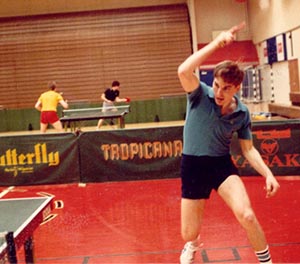Next Blog Will Be Aug. 26, 2024
I was called for jury duty today (leaving shortly), and I’m traveling almost non-stop for the next five weeks. So, I’m putting my blog on hold until I return. HOWEVER – the Tip of the Week will still go up every Monday – I’ve written them through August, and have others outlined for September. Here is this week’s Tip of the Week, as well as last week’s, since I was also out of town and didn’t blog that week.
Welcome to TableTennisCoaching.com, your Worldwide Center for Table Tennis Coaching!
 Photo by Donna Sakai
Photo by Donna Sakai
This is an evolving website and Table Tennis Community. Your suggestions are welcome.
Want a daily injection of Table Tennis? Come read the Larry Hodges Blog! (Entries go up by 1PM, Mon-Fri; see link on left.) Feel free to comment!
Want to talk Table Tennis? Come join us on the forum. While the focus here is on coaching, the forum is open to any table tennis talk.
Want to Learn? Read the Tip of the Week, study videos, read articles, or find just about any other table tennis coaching site from the menu links. If you know of one, please let us know so we can add it.
Want to Learn more directly? There are two options. See the Video Coaching link for info on having your game analyzed via video. See the Clinics link for info on arranging a clinic in your area, or finding ones that are already scheduled.
If you have any questions, feel free to email, post a note on the forum, or comment on my blog entries.
-Larry Hodges, Director, TableTennisCoaching.com
Member, USA Table Tennis Hall of Fame & USATT Certified National Coach
Professional Coach at the Maryland Table Tennis Center
Recent TableTennisCoaching.com blog posts
Next Blog
Next blog will be July 15 Aug. 26, since I’ll be out of town next Monday for most of the next five weeks.
Tip of the Week
Should You Guard Against the Long or Short Serve?
Illegal Chair of the Board
It’s now been 511 days (73 weeks) since USATT elected Richard Char to an illegal third term as chair of the USATT board on Feb. 6, 2023. Here’s my email to the USATT Board in February on the matter. I also blogged about it on Feb. 12, 2024 and Feb. 19, 2024, where I also wrote about other abuses of power.
Tip of the Week
Leave Your Comfort Zone to Develop Strategically.
First Galactic Table Tennis Championships
If you didn’t read it last week, you can still read First Galactic Table Tennis Championships – it’s FREE!!! Aliens from around the galaxy come to Earth for the championship. I had a LOT of fun creating all those aliens, plus there’s lots of intrigue – bribery and blackmail! I also worked in a number of my own experiences into the story, including my infamous quarter-pounders with cheese debacle when I won the 1980 North Carolina Open. Here’s the review at PingSunday.
Tip of the Week
The Surprise Test.
First Galactic Table Tennis Championship
“First Galactic Table Tennis Championships” by Larry Hodges (me!!!) is now online and FREE to read! The 10,000-word novelette, just published by New Myths Magazine, is likely the world’s first science fiction table tennis novelette, with aliens from around the galaxy coming to Beijing for the Galactic Championships.
Tip of the Week
Hitting to the Same Spot Twice.
US Nationals Prize Money Cut
Here’s something many of us didn’t notice until Dan Seemiller pointed it out – USATT canceled prize money in Men’s and Women’s Singles at the Nationals for the quarterfinalists. They also aren’t increasing the prize money to keep up with inflation. Here’s the prospectus. For both Men’s and Women’s Singles, it’s 1st $7,000, 2nd $3,500, and 3-4 $1,750. Quarterfinals? Nothing. (They used to have prize money for the Final 16.)
Tips of the Week
I’m including last week’s since I was out of town and didn’t have a blog, and so you might have missed it.
Junior Trials #2 and No Blog Next Week
I’ll be out of town this next week, coaching at the US Junior Trials Part 2, May 24-27, at the 888 Table Tennis Center in Burlingame, CA. (The broke the trials into two parts this year, with results from both used to finalize the US junior teams.) Here is full info and the player listing. I fly out on Thursday, May 23, and return on Tuesday, May 28. So no blog next week, but there will be the usual Tip of the Week on Monday.
Tips of the Week
I was out of town last weekend, so no blog, but the Tip of the Week went up as usual. In case you missed it, here is that tip and this week’s tip.
Tip of the Week
Shadow Practice for Fitness and Improvement.
No Blog on May 13 - Off to South Dakota!
I’m taking a quick vacation to Rapid City, South Dakota (no, I'm not bringing a dog), May 11-14, Sat-Tue, where I’ll see (much of it in a group tour):
Tip of the Week
Forehand or Backhand Receive in Doubles.
(Excerpt from Table Tennis Doubles for Champions by Larry Hodges. April is Doubles Month!)
Tip of the Week
Serve or Receive First in Doubles?
(Excerpt from Table Tennis Doubles for Champions by Larry Hodges. April is Doubles Month!)
Support Kanak Jha Make History at the Paris 2024 Olympics
Kanak is trying to raise funds on his GoFundMe page for his training for the 2024 Olympics. Can you help? Here’s a note from Kanak:







